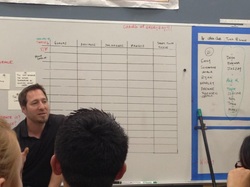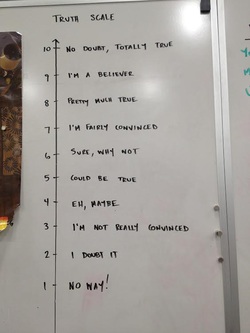Today in class, Andrew introduced to us what the main topic of learning for the rest of the week will be.
We will be going over: Science's relationship to society.
Such examples are:
We spent a portion of class playing a game that helped equip us to identify what is true and what is not.
We will be going over: Science's relationship to society.
Such examples are:
- Science gives people the ability to participate in the frontiers of discoveries/advancements.
- It allows people to experiment, explore, and investigate.
- Science drives technology.
- Science discoveries can protect you.
We spent a portion of class playing a game that helped equip us to identify what is true and what is not.

Our class was broken up into five groups (each table was a group). Then, Andrew would have a random student pull a card out of a deck that had a scientific statement on it that was either true or false. One such example was "You can tell what the temperature is by listening to a cricket's chirp." As a table, you had to determine whether the statement was true or false, and then one person from your table would either hold up a card with a "T" on it (stating your table believed the statement to be true), or an "F" (stating you believed the statement was false).

Some cards in the deck did not have a statement written on them. Instead they had a topic written on them, such as "Bigfoot" or "Evolution." As a table, you had to come to a consensus on how much you believed the statement (and how much scientific evidence there is available to back it up). Then, you would let Andrew know what number you picked.
The winners of the game were determined by how much T or F statements they guessed correctly, and also by how close their Truth Scale predictions were to the truth. The winners, as Andrew stated, were "scientifically minded."
Homework:
The winners of the game were determined by how much T or F statements they guessed correctly, and also by how close their Truth Scale predictions were to the truth. The winners, as Andrew stated, were "scientifically minded."
Homework:
- (Due tomorrow) Lab safety posters! We will have class time to work on these but make sure you finish as much of it as possible tonight.
 RSS Feed
RSS Feed